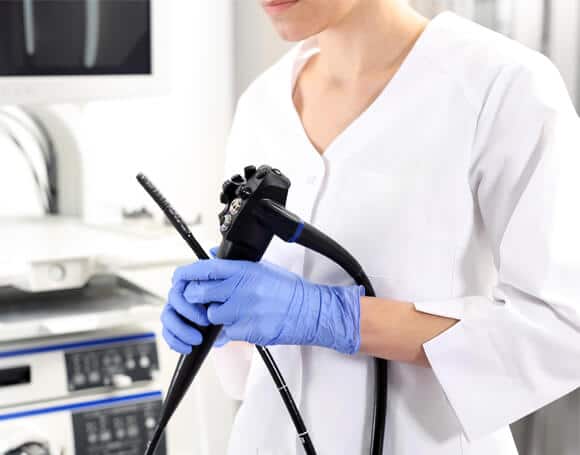What is a colonoscopy?
A colonoscopy is an examination of your large intestine with a camera on the end of a thin flexible tube (a colonoscope). It makes it possible for your Colorectal Specialist to look for causes of things like abdominal pain, rectal bleeding and diarrhoea.
Colonoscopy is performed under sedation. You will be relaxed and sleepy, and won’t know it’s happening.
Complications are rare with colonoscopy and you can trust Dr Kate Gibson to provide a professional colonoscopy treatment to all her Burwood, Campbelltown, and Liverpool patients.
How do I prepare for a colonoscopy?
For your specialist to see your colon, it must be empty. You need to do two things to empty your colon:
- restrict you diet – for at least 24 hours before the procedure stop eating solid foods and just stick to having clear liquids
- clean out your colon with either a series of enemas or by drinking a powerful laxative.
Your specialist will tell you what liquids are okay to drink and when to do the colon cleaning.
Make sure you have someone who can take you home after your colonoscopy. Because you will have had a sedative, you won’t be able to drive yourself home.


What happens during a colonoscopy?
You will lie down on an examination table, usually on your left side. Then you’ll be given an intravenous sedative and you’ll go to sleep.
Your specialist puts a colonoscope into your rectum. It’s about 1 cm wide and has a light and a camera on the tip. It also has a small tube that allows your specialist to pump air into your colon, which gives her a better view of the surface.
During the colonoscopy, your specialist may take samples (biopsies) and remove polyps.
The whole procedure takes about 30 minutes. Afterwards, you’ll go to a recovery room where you’ll stay for 30–60 minutes while you wake up from the sedative.
What happens after a colonoscopy?
It’s likely you’ll feel some cramps and need to pass wind immediately after the procedure.
Before you go home to your Liverpool, Campbelltown, or Burwood home, you’ll be given instructions such as medications to avoid (e.g. blood thinners) and symptoms that you need to call your doctor about (e.g. persistent bleeding, severe pain or fever).
